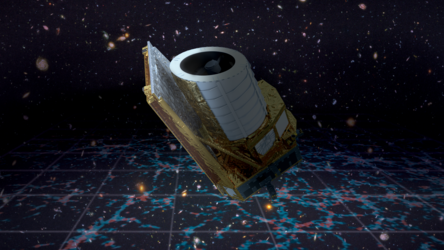Italy uses space to boost healthcare and education
Innovative ideas to use space to improve life on Earth during the coronavirus pandemic are being transformed into reality, thanks to an initiative sponsored by the Italian Ministry for Technological Innovation and Digitalisation, the Italian Space Agency and ESA.
Some 130 ideas were submitted, almost two dozen of which are now being implemented.
The projects involve the most prestigious healthcare institutions in Italy, including the National Institute for Infectious Diseases “Lazzaro Spallanzani”, the Gaslini paediatric hospital, the Policlinico Universitario Fondazione Agostino Gemelli and the Ospedale “Luigi Sacco”.
“Space for Children” aims to promote good mental health among kids and teenagers by changing their perception of the pandemic. It involves children and young people watching a video with real actors who are the same age as them. The children can control the timeline and the sequence of the frames of the story in order to determine the outcome of the video, which contains psychological supporting strategies based on research conducted by psychologists at the world-leading Gaslini paediatric hospital.
As different regions have imposed different restrictions to tackle the pandemic, the system uses satellite navigation to tailor the content to whereabouts the child lives. A young person living in Puglia will get different information than a child in Veneto.
Software house Hypex will provide the service in collaboration with video production company Digivox and staff at the Gaslini hospital.
Young people will also be able to write code to run experiments on the International Space Station remotely from home. The initiative builds on an existing schools-based programme.
The new advanced version of the DreamCoder programme has a virtual classroom to enable tele-education sessions. These will empower students to refine their real-world engineering design skills by programming and analysing experiments on the International Space Station.
The system is powered by Nanoracks in partnership with Genoa-based Rina Consulting.
Meanwhile React-2 will streamline communications between hospitals, primary carers, ambulance operators, civil protection and regional and national government. It will enable everyone to use a single tool to coordinate their efforts so they can improve coordination, communication and decision-making processes. The Policlinico Universitario Fondazione Agostino Gemelli and the National Institute for Infectious Diseases “Lazzaro Spallanzani” will be part of the pilot trial.
Paola Pisano, Minister for Technological Innovation and Digitalisation, said: “Space technology must be useful to improve citizens’ lives. The projects that were selected demonstrate that this is possible: they will help people, schools and healthcare facilities to better manage the difficulties that the COVID-19 pandemic has brought. Space technology can also be applied in other areas such as mobility, the monitoring of infrastructures and the preservation of artistic and cultural heritage.”
Giorgio Saccoccia, President of the Italian Space Agency, said: “The variety and the high quality of the selected projects demonstrate the fundamental role of satellite technology and space-based technology to help mitigate the effects of the pandemic. These projects show the level of excellence of small and medium-sized enterprises in the national supply chain.”
Elodie Viau, ESA Director of Telecommunications and Integrated Applications, said: “We are proud to support European companies in deploying their best ideas in response to the pandemic, demonstrating the strong value that space can bring to people on Earth.”
Riccardo Fraccaro, Undersecretary to the Presidency of the Council of Ministers of Italy, says: “The development of space activities allows us to face the challenges we have to confront. Space-based technologies will make a significant contribution to the provision of innovative solutions to manage the crisis caused by COVID-19. Such a strong response from Italian companies demonstrates how much our country is at the forefront in this field and, as a government, we are proud of our support during ESA’s Ministerial Council as this allowed to increase the budget of the call to 10 million Euros without further financial obligations for Italy.
“The success of this call shows that investing in space always generates greater returns, not only in terms of economics, but also in scientific and social terms.”















 Germany
Germany
 Austria
Austria
 Belgium
Belgium
 Denmark
Denmark
 Spain
Spain
 Estonia
Estonia
 Finland
Finland
 France
France
 Greece
Greece
 Hungary
Hungary
 Ireland
Ireland
 Italy
Italy
 Luxembourg
Luxembourg
 Norway
Norway
 The Netherlands
The Netherlands
 Poland
Poland
 Portugal
Portugal
 Czechia
Czechia
 Romania
Romania
 United Kingdom
United Kingdom
 Slovenia
Slovenia
 Sweden
Sweden
 Switzerland
Switzerland


























